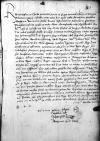Ex quo infausta mors nobis duo exilii nostri firmissima praesidia, ⌊Mathiam Drevicium⌋ et ⌊Petrum Thomicium⌋, abstulerat nec habemus in ⌊istis terris⌋ pontificem, qui ita possit et velit compati adversitatibus nostris, quemadmodum Dominatio Vestra Reverendissima, quae se novissimis litteris suis ad nos scriptis tam benigne obtulit, ut, si qua in re nobis prodesse possit, id nequaquam omittere velit. Quocirca enixe rogamus tam humanissimam Dominationem Vestram dignetur has molestas (sed singulari pietate plenas) preces nostras admittere efficereque apud ⌊regiam maiestatem⌋
⌊Poloniae⌋, dominum nostrum clementissimum, ut sua maiestas quantocius scribere dignetur novello ⌊regi ⌊Daciae⌋ Christierno⌋ et efficaciter exhortari, ut ⌊archiepiscopum et omnes episcopos⌋ regni sui (nobilissimo sanguine prognatos), quos per arces eiusdem ⌊regni⌋ sui divisos durissima captivitate nuper constrinxerat, libertati restituat.
Insuper classem bellicam eo ipso tempore expediverat in ⌊Norvegiam⌋, ut ⌊archiepiscopum⌋ et omnes episcopos eiusdem regni captivos ad se in ⌊Daniam⌋ perducat, nec
cf. Vulg. Ps (H) 104:15 nolite tangere christos meos ⌊christos Domini tetigissecf. Vulg. Ps (H) 104:15 nolite tangere christos meos ⌋ contentus, sed omnes arces et curias ac possessiones eorum (immo et abbatum) suis officialibus possidendas assignavit. Itaque nos tres pontifices, qui ⌊Gedani⌋ sub umbra optimi ⌊regis⌋ exsulamus, feliciores sumus omnibus episcopis in quattuor regnis Aquilonaribus, in quibus desolatae sunt aut mox desolabuntur XXIIII ecclesiae cathedrales, nec parum utile esset, quod ⌊regia maiestas⌋ in eadem causa etiam scribere dignetur illustrissimo ⌊duci⌋ ⌊Prussiae⌋, sororio eiusdem regis ⌊Christierni⌋, per quem idem rex ad saniora consilia facile convertetur.
Plura rei indignitate et molestiarum magnitudine scribere prohibemur. Divina miseratio felicem ⌊regni Poloniae⌋ ecclesiam sub Christianissimo suo ⌊rege⌋ diu felicem conservare dignetur, cui Vestram Dominationem Reverendissimam ex corde et animo commendamus.
Reverendissimae Dominationis Vestrae fratres et amici
⌊Iohannes⌋ archiepiscopus Upsalensis etc., ⌊Iohannes⌋ episcopus Lincopensis subscripsit, ⌊Magnus⌋ episcopus Scarensis


 BCz, 247, p. 280
BCz, 247, p. 280